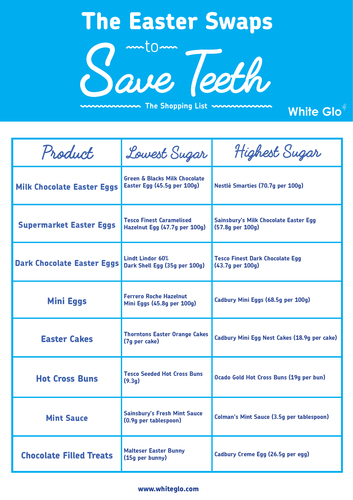Sugar Content in Popular Easter Foods
The Easter Swaps to Save Teeth
• Dentists have created the perfect shopping list to keep teeth happy this Easter
• Recommendations include Malteser Bunnies over Creme Eggs and Green & Blacks over Nestlè Easter eggs
• Brits likely to consume 1KG of sugar over Easter - the equivalent of 250 teaspoons
Mini eggs, chocolate bunnies and hot cross buns are set to become diet staples as Easter approaches. The season of chocolate will surely force even the most dedicated new year dieters in to melt down.
However, some choices are better than others when it comes to oral health, as the constant snacking on sugar puts teeth at risk of cavities and yellowing.
The team of dental experts at White Glo have done the research and put together a guide on the best food hacks to enjoy Easter’s tempting treats, with the best chance of maintaining good oral health.
For those with a weakness for mini eggs, choose Ferrero Roche’s version over Cadbury. Cadbury may be a favourite, but they contain 68.5g sugar per 100g, whereas Ferrero’s version has considerably less at 45.8g.
When it comes to chocolate bunnies, Lindt’s signature gold variety is a clear choice, but the sugar content differs dramatically. Select the Lindt milk chocolate hazelnut version for 41g of sugar, compared to 55g in the standard milk chocolate bunny. For even less sugar, opt for the dark chocolate bunny which has just 35g of the sweet stuff.
Ditching the Easter cake in favour of traditional hot cross buns is another way to give teeth a break.
Choosing Tesco’s Seeded Hot Cross Buns over Cadbury Mini Egg Cakes will cut sugar consumption in half, from 18.9g in the cake, to just 9.3g in the bun. Just make sure to avoid Ocado’s version of hot cross buns, which each contain an astounding 19g of sugar.
When it comes to Easter Day itself, roast lamb is the traditional main of choice, but if mint sauce is your go to accompaniment, avoid hidden sugars by choosing Sainsbury’s Fresh Mint Sauce for just 0.9g of sugar per tablespoon, compared to Colman’s which has three times as much at 3.5g per tablespoon.
Dental expert, Jordan Kirk explains, “With all the sweet treats eaten over the Easter weekend, teeth really don’t get much of a chance to recover. Making smart choices could dramatically reduce the damage to the enamel, but I would recommend brushing your teeth more than you normally would, as damage can be done to your teeth for hours after high sugar foods are consumed.”
Further tips to reduce the damage to teeth this Easter include choosing Green & Black chocolate eggs over Nestlè’s, to slash sugar from around 70g to 45.5g.
Unfortunately, Creme Eggs should also be avoided as each one contains 26.5g of sugar, so opt for a Malteser Bunny instead for 15g of sugar.
Jordan Kirk gives his verdict, “Most people know that sugar causes damage to teeth, but many don’t realise it also makes them look yellow. As the sugar wears down the enamel, the layer underneath, which is yellow in colour, starts to show through. The good news is that along with reducing sugar consumption, you can reverse enamel damage with a good whitening toothpaste like White Glo’s Professional Choice, to restore a white smile.”
While Easter weekend is a time to enjoy food with friends and family, a few smart choices could save a trip to the dentist later in the year.
For more information on how to look after your teeth
visit White Glo
ENDS
Teeth Whitening sample kits are available for press.
Research to be credited to White Glo.
Please get in touch for a PDF version of the shopping list.
For additional comment, imagery, or regional statistics to accompany this release please contact Danielle on danielle@kincomms.com or Jack Terry on jack@kincomms.com or call 02039587085.
Notes to Editors:
White Glo was originally developed exclusively for actors and models but is now available on UK high streets. UK Stockists include; Boots, Superdrug, ASDA, Tesco and Morrisons
White Glo was first established in Australia in 1993 and was the first company to introduce teeth whitening products to the Australian market. White Glo is one of the market leaders in Australia’s whitening toothpaste and teeth whitening industries. White Glo products are now sold in the United Kingdom, South Africa, Russia, Singapore, China, Hong Kong, Japan, Middle East, New Zealand, Papua New Guinea, Greece, Philippines and Cambodia.
